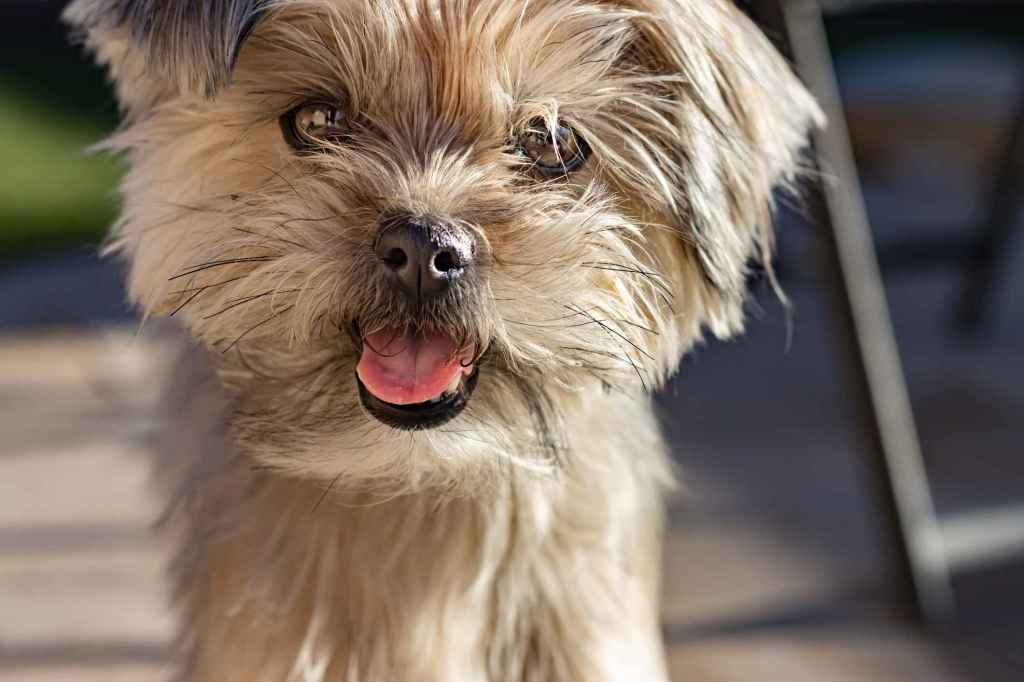The Shorkie, also known as the Shorkie Tzu, Yorkie Tzu, and Shih Tzu-Yorkie mix, is a cross between the Shih Tzu and Yorkshire Terrier dog breeds. Small, fierce, and loyal, these pups inherited some of their parents’ best qualities. Standing only 6 to 14 inches tall at the shoulder and weighing no more than 15 pounds, the Shorkie is a small dog with a big heart. Thanks to both parent breeds’ feisty but loving personalities, the Shorkie temperament is also devoted, lively, spunky, and affectionate. They are also energetic and adaptable, which makes them great dogs for active individuals.
Shorkies are best suited to small or single-person households as they form strong bonds with their owners but dislike sharing their attention. However, they can do well in larger family environments. Be warned; they tend to be yappy, which may not make this breed the best fit for apartments unless you’re ready to work on some dedicated training to curb the habit. If you are looking for a fierce, huge dog personality that comes in a tiny package, a watchdog who will alert you to any visitors, burglars, and mail carriers, and a friend who will love you unconditionally, then the Shorkie just may be the pup for you.
Shorkie characteristics
- Height: 6 to 14 inches
- Weight: 5 to 15 pounds
- Lifespan: 11 to 16 year
Coat and color variations
Shorkies come in various coat colors and patterns, including solid, bi-color, or even tri-color combinations, thanks to the blending of Shih Tzu and Yorkshire Terrier genes. Common colors include black and tan, a popular combination reminiscent of their Yorkie parent, where a rich black coat is highlighted by tan on the chest, face, and legs. Many Shorkies also appear in shades of golden brown, ranging from light tan to deeper chestnut. Another variation includes white and tan, where a primarily white coat is adorned with tan or golden patches, which is more typical of Shih Tzu influence. Some Shorkies inherit a gray or bluish hue, which may darken or lighten as they mature. Additionally, some Shorkies display a blend of these colors in a multi-toned, patchy pattern. With coat types ranging from silky and straight to soft and wavy, the color variations in Shorkies add to their already charming appearance.
What does a Shorkie look like?
The Shorkie, a cross between a Shih Tzu and a Yorkshire Terrier, is a small, sturdy dog with an adorable blend of both parent breeds’ features. They typically weigh between 7 and 15 pounds and stand around 6–11 inches tall. They often have round, expressive eyes that give them an affectionate, slightly mischievous look, and their face can appear sweetly rounded, especially if they inherit more Shih Tzu-like features. Their coat can take after either parent breed and ranges from silky to wavy.

Physical traits and appearance
Size and build
- Size: Small and compact, typically weighing between 7–15 pounds and standing around 6–11 inches tall.
- Body: A sturdy build with a slightly elongated body, similar to Shih Tzus but often with a more streamlined look from the Yorkie side.
- Tail: Tends to have a fluffy, curled tail, though some have straighter tails influenced by the Yorkie parent.
Facial features
- Face: Round face with large, expressive eyes that often have a soft, endearing look.
- Nose: Often black, though it can vary in shades, especially in lighter-colored Shorkies.
- Ears: Floppy ears, though some may have Yorkie-like, semi-erect ears depending on genetics.
How big does a Shorkie get?
A Shorkie typically grows to be a small dog, weighing between 7 to 15 pounds and standing around 6 to 11 inches tall at the shoulder. Their size can vary depending on which parent breed they take after more—some Shorkies are closer in size to the Yorkshire Terrier, staying on the smaller end, while others may be slightly larger if they inherit more Shih Tzu traits. Shorkies have a compact and sturdy build, and even though they’re small, they often appear well-proportioned and solid.
Shorkie personality
Shorkies are known for their affectionate, lively, and loyal personalities. They tend to be devoted companions, forming close bonds with their families and often displaying a strong desire to be near their favorite people. Shorkies are generally friendly, though they may inherit a bit of a feisty, spirited side from their Yorkshire Terrier lineage, making them surprisingly bold for their small size. They are also energetic and playful, especially with interactive toys and games, but they balance this with a love of snuggling and can be quite content to relax on a lap for hours. While Shorkies are often friendly with family members, they may be somewhat cautious around strangers and can be a bit vocal, alerting their owners to new sights or sounds. With proper socialization, they can get along well with children and other pets, though they tend to prefer gentler handling due to their small stature.
Temperament and behavior
- Affectionate: Loves bonding with family members, often becoming very attached.
- Loyal: Tends to form strong, loyal connections with a favorite person or family.
- Energetic and Playful: Enjoys interactive play and short bursts of high-energy activities.
- Loves Cuddling: Happy to snuggle and stay close to people when not playing.
- Alert and Vocal: Known to bark when sensing new people, sounds, or activities.
- Social but Cautious: Friendly with family but may be wary of strangers; benefits from socialization.
- Adaptable: Can adjust well to small living spaces as long as they get regular attention.
- May Have a Stubborn Streak: Inherits some independence from Yorkie side; may need gentle training reminders.
Training and socialization
Early socialization and positive reinforcement training are crucial due to their intelligence and potential stubbornness. Of course, their intelligence allows them to pick up commands quickly, so early training is key to establishing good behavior from the start. Use praise, treats, and affection to reward desired behavior. Shorkies respond well to positive reinforcement, and this approach will keep them motivated and engaged.
Training tips:
- Be Consistent: Consistency is crucial in training. Use the same commands and routines to avoid confusion. This helps your Shorkie understand what is expected of them.
- Keep Training Sessions Short and Fun: Shorkies are intelligent but can lose interest if training sessions are too long or repetitive. Keep sessions short (10-15 minutes) and engage with varied activities.
- Mental Stimulation: Incorporate puzzle toys, obedience training, and interactive games into their routine to challenge their mind. A bored Shorkie can become restless or destructive. Once basic obedience is established, teach more advanced commands or tricks. Their intelligence makes them excellent candidates for agility training, fetch, or scent games.
Shorkie care
Caring for a Shorkie involves providing a balanced mix of physical exercise and mental stimulation to ensure they lead happy, healthy lives. These small, affectionate dogs thrive on companionship and should be included as integral members of the family, receiving plenty of love and attention. Daily walks and playtime are essential to keep their energy levels in check and to prevent boredom, which can lead to behavioral issues. Shorkies are generally adaptable and can live comfortably in various living environments, including apartments, as long as their exercise needs are met. Regular veterinary check-ups, vaccinations, and preventive treatments for parasites are important to maintain their health. Socialization from an early age helps Shorkies become well-adjusted adults, capable of interacting positively with other pets and people.
Grooming needs
Shorkies have moderate to high grooming needs due to their diverse coat types, which can range from silky and straight to wavy or curly. Regular brushing is essential to prevent matting and tangling, especially in longer or curlier coats. Depending on their coat type, Shorkies may require professional grooming every four to six weeks to keep their fur neat. Bathing should be done as needed, typically once a month, using a gentle dog shampoo to maintain coat health and cleanliness. Additionally, routine care includes trimming their nails, cleaning their ears, and brushing their teeth to ensure overall hygiene and comfort.

How to Groom a Yorkie
Grooming a Yorkshire Terrier (Yorkie) requires attention to detail and regular maintenance to keep their luxurious coat healthy and free from tangles.
Coat care
- Brushing: Brush daily to prevent mats and tangles Use a slicker brush and a metal comb. Start by brushing the longer hair first, gently working through any knots. Follow up with a metal comb to ensure all tangles are removed.
- Bathing: Bathe every three to four weeks or as needed. Use a high-quality, tear-free dog shampoo and conditioner.
- Trimming and Cutting: At-home or professional grooming should be done every four to six weeks. Focus on the face, paws, sanitary areas, and tail to keep the coat manageable.
Ears, nails, and teeth
- Nail Trimming: Trimming should be done every two weeks or as needed using dog nail clippers or a grinder.
- Ear Cleaning: Ear cleaning should be performed weekly using a vet-recommended ear cleaner. Gently wipe the outer ear with a cotton ball soaked in the cleaner, avoiding deep insertion into the ear canal.
- Teeth Brushing: Several times a week using a dog-specific toothbrush and toothpaste.
Check for skin issues
- Inspect Regularly: As you groom, check their skin for any signs of irritation, redness, or bumps. If you notice anything unusual, consult a vet.
Flea, tick, and parasite control
Keep up with flea and tick prevention treatments, especially if your Shorkie spends much time outdoors. Regular grooming allows you to spot parasites early.
Early acclimation is key
Getting your Shorkie accustomed to grooming procedures from a young age makes the process easier and more enjoyable for both of you. Handle their paws frequently, examine their mouth and ears, and reward them for good behavior during grooming sessions. This positive foundation sets the stage for stress-free veterinary exams and handling throughout their lives.
Feeding and nutrition
Shorkies require a balanced, high-quality diet tailored to their small size, age, and activity level. Given their compact bodies and active nature, they benefit from nutrient-dense food with the right mix of protein, healthy fats, and essential vitamins to support their energy needs and maintain a healthy coat. Small-breed dog food is ideal, as it typically has smaller kibble that is easier for Shorkies to chew and digest. Feeding them in small, measured portions—usually two to three meals per day—can help maintain their energy levels throughout the day and prevent overeating, which is crucial given their tendency toward weight gain.
- Puppy Portions: Feed a Shorkie puppy about ¼ to ½ cup of high-quality puppy food per day, divided into three meals. This helps support their growth and keeps their energy stable throughout the day.
- Adult Portions: Feed an adult Shorkie ½ to 1 cup of adult dog food per day, divided into two meals. Adjust portions based on their weight and activity level, with more food for very active Shorkies and less for more sedentary ones.
- Senior Portions: Senior Shorkies often do well with about ½ cup of senior dog food daily, split into two meals. Older dogs may need fewer calories but more fiber for digestion, so a senior formula can be beneficial.
- Adjust According to Activity Level: Highly active Shorkies may need a bit more food to sustain their energy, while less active Shorkies might need slightly less to avoid weight gain. Monitor their weight and adjust portions as needed.

Shorkie health issues
The Shorkie breed is predisposed to some of the same conditions that the Shih Tzu and Yorkshire Terrier face. While most are generally healthy, some may be prone to a few health issues, so it is important to maintain good care and regular veterinary checkups. Some of the more common health problems Shorkies suffer from include:
- Brachycephalic Airway Syndrome: This condition primarily affects brachycephalic (short-nosed) dog breeds and can involve multiple issues such as narrowed nostrils, elongated soft palate, and a small trachea. These structural abnormalities obstruct airways, leading to breathing difficulties, snoring, and exercise intolerance.
- Dental Disease: Dental disease in dogs encompasses various oral issues, including plaque, tartar buildup, gum inflammation (gingivitis), and tooth decay. If left untreated, dental disease can result in pain and tooth loss, potentially affecting overall health.
- Glaucoma: Glaucoma is an eye condition characterized by increased pressure within the eye. If not treated promptly, it can lead to optic nerve damage, vision loss, and severe eye pain. Glaucoma can be primary (genetic) or secondary (resulting from other eye issues).
- Hypoglycemia: Hypoglycemia refers to low blood sugar levels. In dogs, it can be caused by various factors, including inadequate food intake, underlying health conditions, or excessive physical activity. If not addressed, hypoglycemia can result in seizures, weakness, confusion, and even coma.
- Lens Luxation: Lens luxation is a condition in which the eye’s lens becomes displaced from its normal position. It can be painful and vision-threatening, potentially leading to secondary issues like glaucoma. Lens luxation may be caused by genetic factors or eye trauma.
Shorkie and family compatibility
Shorkies are known for their affectionate and friendly nature, making them generally great companions for families. Their small size and playful temperament allow them to adapt well to various living situations, whether in an apartment or a larger home. Shorkies tend to bond closely with their family members and enjoy being involved in daily activities, which makes them excellent companions for both children and adults.
When properly socialized from a young age, Shorkies usually get along well with children and can be playful partners in family games. However, due to their small size, it’s important to teach children how to interact gently with them to prevent accidental injury. Shorkies can also coexist peacefully with other pets, especially if introduced gradually and positively.
While Shorkies love attention and companionship, they can also experience separation anxiety if left alone for long periods. Families who are home often or can include their Shorkie in daily activities will find that these dogs thrive in a loving environment.
Shorkie rescue groups
Finding a breed-specific rescue for Shorkies may be hard because they are a mixed breed. However, you may want to try Yorkshire Terrier or Shih Tzu breed-specific rescues, as they often care for mixes. Here are some rescues you can try:
If you choose to purchase a Shorkie, finding a reputable dog breeder is crucial. Reputable breeders are committed to breeding healthy, well-socialized puppies that will make great companions. They will screen their breeding stock for health problems, socialize their puppies from a young age, and provide you with lifetime support. On the other hand, backyard breeders are more interested in making a profit than in producing healthy, well-adjusted puppies. To avoid contributing tin inhumane breeding practices, always research reputable breeders or adopt from rescues.













